Who Will Be Your Welsh Hidden Heroine? Vote to decide who will be immortalised as the first public statue of a historical Welsh woman in Wales.
Elizabeth Andrews (1882-1960)
A Welsh-speaking Rhondda seamstress who left school at 13, Elizabeth became one of the most politically active Welsh women of the early 20th century. This suffragist and miner’s wife put the needs of women and children at the heart of her campaigns. She told the world how mining affected colliers’ families too, fighting for pit-head baths and better housing. She encouraged women to become politically engaged and use their hard-won vote, setting up women’s groups which she called “working women’s universities”. She also became one of Britain’s first female magistrates. And at a time when “domestic issues” were rarely discussed in male-dominated local government, she campaigned for maternity rights, childcare and founded one of the earliest nursery schools in Wales.
For full information and how to vote: https://www.bbc.co.uk/programmes/profiles/38Q6q4s1KJ4bZKr9dZMn5W/elizabeth-andrews
Betty Campbell (1935–2017)
The child of Butetown who was told by her teacher a working class black girl could never aspire to the academic heights proved her doubters wrong in the most inspirational way. She became Wales’ first headteacher to be a woman of colour and championed her nation’s multicultural heritage throughout her life. No wonder Nelson Mandela sought her out on his only visit to Wales. Her school became a template throughout the UK for good practice in multicultural education while Betty also helped create Black history Month. She continued to influence Welsh life through a series of public appointments, serving as an independent councillor for Butetown, a board member for BBC Wales, a member of the Home Office’s race advisory committee and a member of the Commission for Racial Equality.
For full information and how to vote: https://www.bbc.co.uk/programmes/profiles/1p7r3fkpsWTbQ9shCFh1QXc/betty-campbell
Cranogwen – Sarah Jane Rees (1839-1916)
Described as “the most outstanding Welsh woman of the 19th century” and known by her bardic name of Cranogwen, Llangrannog-born Sarah Jane Rees excelled in many fields. She was a master mariner, a qualification that allowed her to command a ship in any part of the world. She was a head teacher at 21 and as a poet, she was the first female winner at the National Eisteddfod, a feat that brought her fame across Wales. As a lecturer and preacher, she travelled across Wales and America. As a journalist, she became the first woman to edit a Welsh-language women’s magazine, Y Frythones, which campaigned for girls’ education. And she founded the South Wales Women’s Temperance Union and outlined her vision for homes that rehabilitated homeless young women.
For full information and how to vote: https://www.bbc.co.uk/programmes/profiles/5NBLyP27sktHGm6ljTG9h6J/cranogwen-sarah-jane-rees
Elaine Morgan (1920 -2013)
Author, television dramatist and evolutionary theorist, a true Renaissance woman of Wales who excelled in both the arts and science. From the humblest of beginnings in Hopkinstown, Elaine changed the world yet never abandoned her valleys roots. An award-winning scriptwriter she helped create some of the seminal dramas of the 60s, 70s and 80s, from Testament of Youth to The Life and Times of Lloyd George. She brought equality to evolutionary theory with her pioneering book The Descent of Woman – which become a keytext in the Women’s liberation movement and saw her feted by the major American feminist thinkers of the day. And Elaine’s advocacy of the Aquatic Ape theory of evolution brought her global recognition. At the age of 89 the Ted Talk she gave on evolutionary theory attracted more than a million viewers.
For full information and how to vote: https://www.bbc.co.uk/programmes/profiles/5SQ4jD8FVf10RlhG7mjcPPJ/elaine-morgan
Lady Rhondda – Margaret Haig Thomas (1883-1958)
She may have been a Welshwoman of privilege but Lady Rhondda used that privilege in the best way possible – to fight for the rights of all women. She did things few other women of her background would have dared. A suffragette who made the fight for the vote front page news, she was sent to prison where she went on hunger strike. She continued to campaign until all women got the vote in 1928. During World War I, she oversaw the recruitment of women into the services. She was the greatest global businesswoman of her era, sitting on the board of 33 companies and chairing seven of them. She also became the first female to head the Institute of Directors. As a journalist she created a ground-breaking magazine that featured the biggest literary names of the 20th century. And she was the “persistent peeress” whose four decades of campaigning ensured females could finally take their seats in the House of Lords.
For full information and how to vote: https://www.bbc.co.uk/programmes/profiles/5bYLKV295686Jm8tHjb7mfW/lady-rhondda-margaret-haig-thomas











